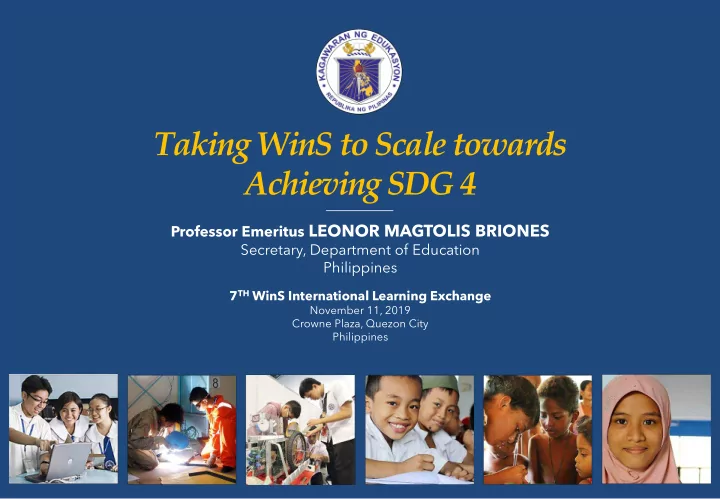

Taking WinS to Scale towards Achieving SDG 4 Professor Emeritus LEONOR MAGTOLIS BRIONES Secretary, Department of Education Philippines 7 TH WinS International Learning Exchange November 11, 2019 Crowne Plaza, Quezon City Philippines
Importance of the Sustainable Development Goals for WASH in Schools (WinS) Sustainable Development Goals 4 & 6 provided clear targets and indicators that led to the creation of a national WinS policy (DepEd Order No. 10, Series of 2016) and the benchmarking of national standards. DEPARTMENT OF EDUCATION 2
Global Estimate for Water, Sanitation, and Hygiene in Schools (WinS) According to the Joint 100% Monitoring 19 90% 23 Programme of the 36 80% WHO and UNICEF, 12 Proportion of Schools (%) 12 two thirds of schools 70% all over the world 60% 11 have access to drinking water from 50% an improved source, 40% two thirds have usable 69 66 30% gender-segregated 53 toilets, and over half 20% of schools have 10% handwashing facilities and soap. 0% Drinking Water Sanitation Hygiene Basic Limited No Service SOURCE: : WHO/UNICEF JMP (2018) Global Estimates DEPARTMENT OF EDUCATION 3
The Situation of Water, Sanitation, and Hygiene in Schools (WinS) in the Philippines 100% 1.13 90% 37.61 39.83 80% Half of schools have Proportion of Schools (%) 70% 59.87 access to drinking water. On the other 60% 12.09 hand, Less than half 14.28 50% have handwashing facilities with water 40% and soap, and nearly 30% 45% have gender- 50.31 45.89 20% 39.01 segregated, usable toilets. 10% 0% Drinking Water Sanitation Hygiene Basic Limited No Service SOURCE: : WHO/UNICEF JMP (2018) Global Estimates DEPARTMENT OF EDUCATION 4
DepEd’s commitment in improving health and sanitary practices of learners For the past few years, the Department has been implementing programs that are targeted in improving the health and sanitary practices of Filipino children : a) Integrated Helminth Control Program (IHCP); b) Immediate Construction of Water and Hand Washing Facilities in All Schools for the Prevention of Influenza AH1N1 (DO no. 56, s. 2009); c) Implementation of the Essential Health Care Program (EHCP) for the School Children (DO no. 65, s. 2009). DEPARTMENT OF EDUCATION 5
DepEd’s commitment in improving health and sanitary practices of learners The implementation of the Comprehensive Water, Sanitation, and Hygiene in Schools (WinS) Program (DepEd Order No. 10, s. 2016) has expanded the scope of the previous programs of the Department. The WinS Program is designed to achieve learning and health outcomes and improve school attendance of students through a comprehensive, sustainable, and scalable school-based water, hygiene, sanitation, health education and deworming program. DEPARTMENT OF EDUCATION 6
Three-Star Approach of WinS Program The Three-Star Approach is designed to advance the effectiveness of various programs while ensuring that schools meet the essential indicators (water, sanitation, hygiene practices, deworming, and health education) for providing a healthy environment for children. In this approach, schools are encouraged to make gradual, incremental improvements towards reaching standards. The five indicators must be met before being eligible for a star. DEPARTMENT OF EDUCATION 7
3/4 of schools nationwide have participated in WinS monitoring to report their WinS status The first round of TSA monitoring was launched for SY 2017-2018, and the second round of data collection happened at the end of SY 2018-2019. Of the 47,023 public schools, 74.4% (35,005) have submitted their WinS status in the second round of monitoring. The participation of schools has increased from 65.6% (SY 2017-2018) to 74.4% (SY 2018-2019). Participation is highest among areas of the National Capital Region (NCR), Region IV-B, and Region VI in which almost all schools have participated in the second round of monitoring. DEPARTMENT OF EDUCATION 8
Conclusion Four years after the Sustainable Development Goals have been established, and two years after the WinS Program has been implemented, the Philippines has already made major strides in improving the health and sanitation practices of our learners. DEPARTMENT OF EDUCATION 9
Conclusion With health and sanitation as an essential aspect for a child to learn effectively, the challenge for all of us is to renew our commitment in improving our WinS Program, and strive to have basic WASH services in each and every school. DEPARTMENT OF EDUCATION 10
Thank you! Professor Emeritus LEONOR MAGTOLIS BRIONES Secretary, Department of Education Philippines 7 TH WinS International Learning Exchange November 11, 2019 Crowne Plaza, Quezon City Philippines
Recommend
More recommend